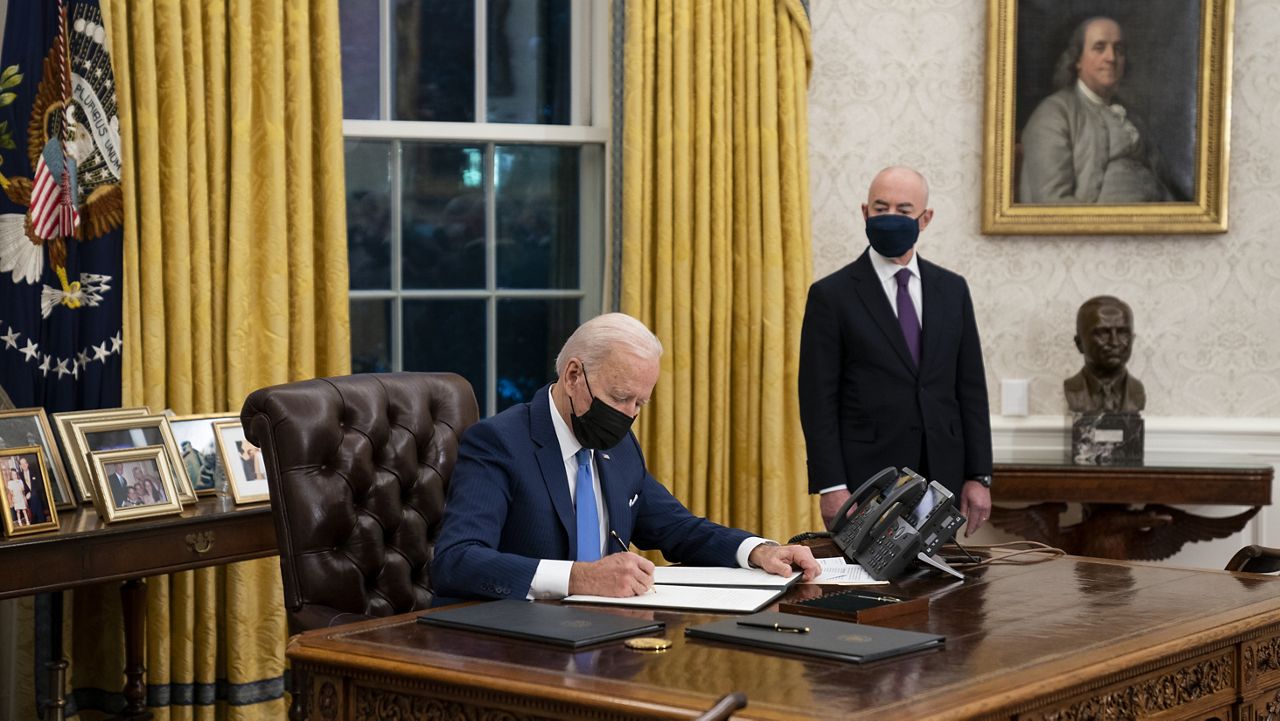President Joe Biden signed three executive orders Tuesday that build on his efforts to undo former president Donald Trump’s restrictive immigration policies, including one that will create a task force to reunite migrant families separated at the border.
Another order addresses increased migration at the southern border, including a review of the Migrant Protection Protocols (MPP) – otherwise known as the "Remain in Mexico" policy – which requires migrants to wait in Mexico while their asylum claim plays out in court.
A third executive action orders an assessment of restrictions the Trump administration put on legal immigration, including a review of the public charge rule and the naturalization process.
“I’m not making new law, I’m eliminating bad policy,” President Biden said Tuesday, addressing the large number of executive orders he’s signed in his first two weeks.
“This is about how America is safer, stronger, more prosperous when we have a fair, orderly and humane legal immigration system," he added.
The task force to reunite families will be led by Secretary of Homeland Security Alejandro Mayorkas, who was confirmed by the Senate Tuesday afternoon.
“We’re going to work to undo the moral and national shame of the previous administration that literally, not figuratively, ripped children from the arms of their mothers and fathers at the border," Biden said before signing the order.
The task force will seek to identify any kids separated from their parents at the border, not just those separated by the administration’s "zero tolerance" policy in 2018. At least 600 children remain separated from their parents, according to recent court filings.
A second order tackles issues at the southern border, including the root causes of migration, the asylum system and the policy that’s sent about 70,000 migrants back to Mexico after seeking entry at the U.S. perimeter, many who go on to live in dangerous, makeshift tent camps nearby.
One study found that 20 percent of those migrants were threatened with physical violence, according to the Migration Policy Institute, while another tracked hundreds of cases of murder, rape, kidnapping, and other attacks against people returned because of MPP.
While the Biden administration has stopped enrolling people in MPP, officials did not detail what would happen to the thousands of migrants currently waiting in Mexico.
"There is no doubt that as we determine new and more humane policies to review cases for asylum, a population of people who still have active cases in that MPP program have to be part of that solution," a senior administration official said Monday.
The final order that Biden signed Tuesday will focus on "restoring faith" in the legal immigration system, another target of restrictions under former president Trump.
It includes a review of the public charge rule, which considers a migrant’s use of public benefits when they apply for a green card or visa. The rule gave the administration broad judgement to deny legal immigrants based on what advocates have called a "wealth test."
"All of those things have a huge impact on our ability to grow, attract talent, and also for communities, many of which have been obviously hit hard by the pandemic and are in the process of trying to recover," said Dan Wallace, Deputy Managing Editor at New American Economy, which looks at the economic impact of immigration.
An analysis by New American Economy found that 90 percent of immigrants potentially affected by the public charge rule were employed, and if those impacted were to leave the U.S., the country would suffer an indirect loss of nearly $34 billion.
The order on legal immigration also aims to streamline the naturalization process. It became backlogged as a result of longer processing times and increased vetting under the Trump administration, which also made naturalization more expensive.
"Immigrants are a huge part of our essential workforce," Wallace said, citing the large number of foreign-born workers represented in the food and agricultural sectors.
Not included in Tuesday’s orders was an increase in the refugee admissions cap, which former President Trump slashed to 15,000 in the fall, the lowest number ever set by an administration. President Biden is expected to boost the cap to 125,000 as part of his initial overhaul of the immigration system.
Earlier this week, the Biden administration also asked the Supreme Court to cancel oral arguments in the “Remain in Mexico” case on Monday, as well as a case on funding for the border wall between the U.S. and Mexico. Both cases were scheduled in the coming weeks. Biden already issued an order to halt construction on the border wall.



